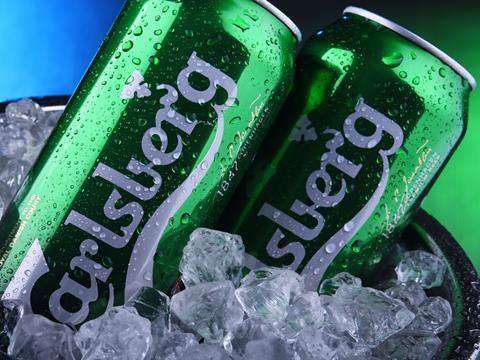
After taking steps to lightweight its beer cans, Carlsberg and Ball are laying out a joint roadmap to pursue their shared sustainability goals, including higher recycling rates and an increase in recycled content in cans by 2030.
Over the last three years, the partners have worked to lightweight Carlsberg’s 33cl and 50cl cans by around 5% in over ten European countries – a move set to reduce material consumption and cut the carbon footprint of its value chain by approximately 5,000 tonnes every year. This is set to form one facet of their roadmap.
To encourage consumers to return their used cans for recycling, the companies are trialling a deposit return scheme in Serbia. A “Metal Recycles Forever” logo has been printed onto the cans to spread awareness of the reported ‘infinite recyclability’ of aluminium.
Ball’s cans are already said to contain an average of 62% recycled aluminium in a mix of pre- and post-consumer recycled material. Driving more collection and recycling is anticipated to result in easier access to post-consumer recycled content, helping the companies pursue their shared targets.
“Partnering with suppliers who share our values and commitment is key to reaching our ambitious targets on our journey Together Towards ZERO and Beyond,” says Johan Keerberg, VP Group Procurement at Carlsberg Group.
“Our collaboration with Ball has already delivered notable improvements in lightweighting – a critical lever for decarbonization and materials use in our shared value chain. Now we’re going further through joint efforts to increase the circularity of our cans.”
“We are pleased to continue to partner with Carlsberg and collaborate on our aligned goals including a 90% recycling rate by 2030,” continues Björn Kulmann, VP Sustainability at Ball Corporation. “Carbon reduction across our value chains is a key focus and lightweighting our cans is one way we have achieved this with Carlsberg, resulting in significant carbon savings in 2023.
“Our collaboration with Carlsberg will help us to meet our own Climate Transition Plan while delivering positive impact across our shared value chain.”
In its wider pursuit of sustainability goals, Ball has sold its aerospace business to BAE Systems in order to focus on developing low-carbon aluminium packaging. It also joined forces with Coca-Cola Europacific Partners to partially fuel delivery vehicles with hydrotreated vegetable oil in hopes of cutting down on carbon emissions in transit.
On another note, Carlsberg recently unveiled a new, limited-edition packaging design from professional designer Ofen Hu to celebrate the Lunar New Year through visual storytelling.
If you liked this article, you might also enjoy:
The Lidl approach to packaging sustainability
How did Brazil achieve its 100% aluminium can recycling rate – and can it be replicated in the EU?
Experts have their say on the EU’s Packaging and Packaging Waste Directive revisions
A deep dive into the most important packaging sustainability trends and solutions














No comments yet